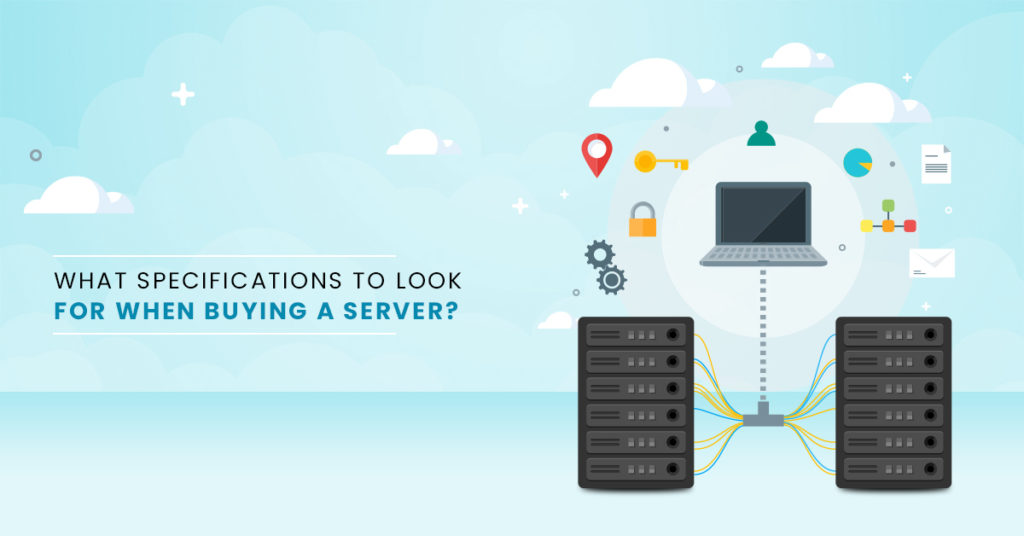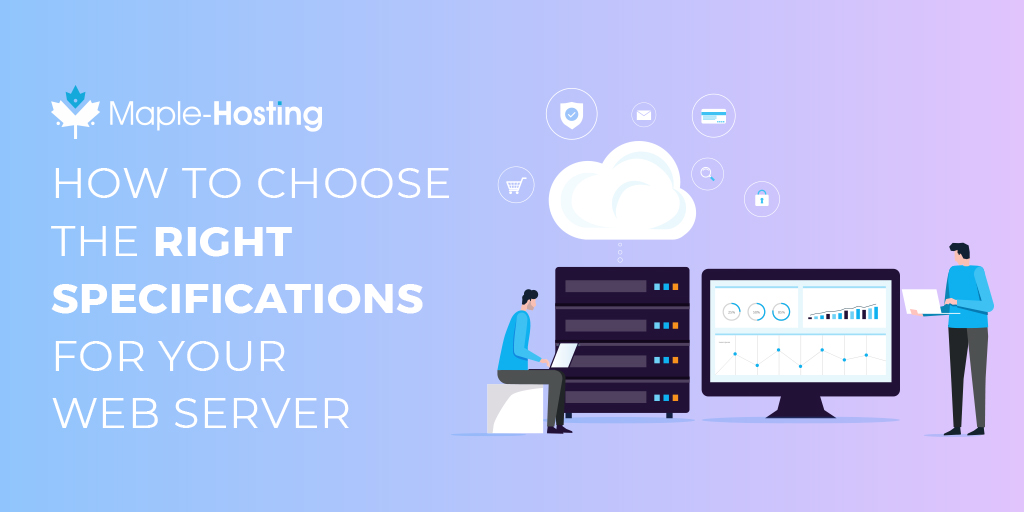Choosing server specs for eCommerce platforms: A Comprehensive Guide

Choosing server specs for eCommerce platforms is a crucial aspect of optimizing online businesses. From CPU power to RAM capacity, each component plays a vital role in ensuring smooth operations and enhanced user experience. Let's delve into the intricate details of selecting the right server specifications to propel your eCommerce platform to success.
As we explore the factors that influence server specs, we'll uncover the key considerations that can make a significant difference in your online store's performance.
Factors to consider when choosing server specs

When setting up an eCommerce platform, selecting the right server specifications is crucial to ensure smooth operation and optimal performance. Here are some key factors to consider:
CPU power for eCommerce platforms
The Central Processing Unit (CPU) plays a vital role in the performance of an eCommerce platform. A powerful CPU can handle complex calculations and processes efficiently, ensuring quick response times for website visitors. It is essential to choose a CPU with sufficient processing power to support the demands of your online store.
Role of RAM in handling simultaneous user requests
Random Access Memory (RAM) is responsible for managing the simultaneous requests from multiple users accessing your eCommerce platform. Adequate RAM ensures that the server can handle a high volume of traffic without slowing down or crashing. It is recommended to have enough RAM to support the number of users visiting your website concurrently.
Significance of storage type (SSD vs HDD) for fast data access
The type of storage used in the server, whether Solid State Drive (SSD) or Hard Disk Drive (HDD), significantly impacts the speed of data access on your eCommerce platform. SSDs are faster and more reliable than HDDs, leading to quicker loading times for web pages and improving overall user experience.
Opting for SSD storage can enhance the performance of your online store.
Impact of bandwidth on handling high traffic volumes
Bandwidth refers to the amount of data that can be transferred between the server and users within a specific period. Sufficient bandwidth is essential for handling high traffic volumes on your eCommerce platform, especially during peak hours or promotional events.
A higher bandwidth capacity ensures that your website can accommodate increased traffic without experiencing slowdowns or downtime.
Determining the right CPU specifications

When selecting the CPU specifications for your eCommerce server, it's crucial to consider various factors to ensure optimal performance and efficiency. Let's delve into the key aspects to keep in mind.
Compare different CPU types
When choosing between Intel and AMD CPUs for your eCommerce server, it's essential to evaluate factors such as performance, power consumption, and compatibility with your specific platform. Intel processors are known for their strong single-core performance, making them ideal for tasks that require high processing power per core.
On the other hand, AMD processors often provide better multi-core performance at a lower price point, making them a cost-effective option for tasks that can benefit from parallel processing.
Selecting the appropriate number of CPU cores
The number of CPU cores you need for your eCommerce server depends on the workload and tasks you expect it to handle. For small to medium-sized eCommerce platforms, a CPU with 4-8 cores should suffice. However, for larger platforms with heavy traffic and complex operations, opting for CPUs with 12 or more cores can improve performance and scalability.
Significance of clock speed in CPU performance
Clock speed, measured in GHz, plays a critical role in determining how quickly a CPU can process instructions. Higher clock speeds generally result in faster single-core performance, making them suitable for tasks that require quick response times. When selecting a CPU for your eCommerce server, consider a balance between core count and clock speed to ensure optimal performance for your specific workload.
Impact of cache memory size on server speed
Cache memory, including L1, L2, and L3 caches, helps reduce the time it takes for the CPU to access frequently used data. Larger cache sizes can improve CPU performance by reducing latency and enhancing data retrieval speeds. When choosing a CPU for your eCommerce server, consider CPUs with larger cache sizes to boost overall server speed and responsiveness.
Choosing the optimal RAM capacity
When it comes to selecting the right RAM capacity for your eCommerce platform, several factors need to be considered to ensure optimal performance and seamless user experience.RAM, or Random Access Memory, plays a crucial role in storing data temporarily while the server processes requests.
The amount of RAM required depends on the level of traffic your website receives. To calculate the necessary RAM capacity, you can use the following formula:
Required RAM = Average Page Size x Average Daily Visitors x Peak Time Factor
Peak Time Factor accounts for any spikes in traffic during specific periods, ensuring that your server can handle sudden increases in demand without slowing down.
Benefits of ECC RAM for data integrity
ECC (Error-Correcting Code) RAM is designed to detect and correct memory errors, making it ideal for eCommerce transactions where data accuracy is paramount. By using ECC RAM, you can minimize the risk of data corruption and ensure the integrity of customer information during online transactions.
Recommendations for DDR3, DDR4, and DDR5 RAM
When choosing between DDR3, DDR4, and DDR5 RAM, consider factors such as compatibility with your server motherboard, data transfer speeds, and cost-effectiveness. DDR4 RAM is currently the most common choice for servers, offering a good balance of performance and affordability.
However, DDR5 RAM is the latest generation and provides faster data transfer speeds, making it suitable for high-demand eCommerce platforms that require exceptional performance.
Importance of memory speed in enhancing server performance
Memory speed, measured in MHz, determines how quickly data can be accessed and processed by the server. Faster memory speed can significantly improve server performance, especially when handling multiple requests simultaneously. Choosing RAM modules with higher memory speed can help reduce latency and ensure smooth operation of your eCommerce platform, enhancing user experience and overall efficiency.
Storage considerations for eCommerce platforms
When it comes to choosing server storage for eCommerce platforms, there are several important factors to consider in order to ensure optimal performance and reliability.Advantages of SSDs and HDDs:Solid State Drives (SSDs) are known for their speed and reliability compared to traditional Hard Disk Drives (HDDs)
SSDs use flash memory for data storage, which allows for faster read and write speeds. This can significantly improve the overall performance of an eCommerce platform by reducing loading times and increasing responsiveness. On the other hand, HDDs are more cost-effective and offer higher storage capacities, making them suitable for storing large amounts of data that do not require frequent access.RAID configurations for data redundancy and performance optimization:Redundant Array of Independent Disks (RAID) configurations can help improve both data redundancy and performance optimization for eCommerce platforms.
By using RAID, data is distributed across multiple disks, which provides redundancy in case of disk failure and can also improve read and write speeds. Different RAID levels offer various benefits such as mirroring for data redundancy (RAID 1) or striping for performance optimization (RAID 0).Role of NVMe drives in enhancing server storage performance:NVMe (Non-Volatile Memory Express) drives are another option for enhancing server storage performance.
These drives use a faster interface compared to traditional SATA SSDs, allowing for even higher read and write speeds. NVMe drives are particularly beneficial for applications that require intensive data processing, such as eCommerce platforms with high traffic volumes.Guidelines for determining the optimal storage capacity:When determining the optimal storage capacity for an eCommerce platform, it is essential to consider the volume of data that will be stored and processed.
Factors such as the size of the product catalog, customer database, and media files should be taken into account. It is also important to anticipate future growth and scalability needs to ensure that the chosen storage capacity can accommodate the platform's expansion.
SSD vs. HDD
- SSDs offer faster read and write speeds compared to HDDs, improving overall performance.
- HDDs are more cost-effective and offer higher storage capacities, making them suitable for large-scale data storage.
RAID configurations
- RAID configurations provide data redundancy and performance optimization through disk distribution.
- RAID levels such as RAID 1 for mirroring and RAID 0 for striping offer different benefits.
NVMe drives
- NVMe drives use a faster interface than SATA SSDs, leading to higher read and write speeds.
- Beneficial for applications requiring intensive data processing, such as high-traffic eCommerce platforms.
Optimal storage capacity
- Consider the volume of data to be stored and processed, including product catalog, customer database, and media files.
- Anticipate future growth and scalability needs to ensure the chosen storage capacity is sufficient.
Network requirements and bandwidth considerations
The network requirements and bandwidth considerations play a crucial role in ensuring the optimal performance of eCommerce platforms. A robust network infrastructure is essential to handle the high volume of online transactions and traffic that eCommerce websites experience.
Importance of network speed
Network speed is a vital factor for eCommerce platforms as it directly impacts the loading times of web pages and the overall user experience. Faster network speeds ensure quick access to product pages, seamless checkout processes, and minimal downtime, which are all essential for customer satisfaction.
Significance of bandwidth allocation
Bandwidth allocation is critical for eCommerce platforms, especially during peak traffic periods such as sales events or promotional campaigns. Sufficient bandwidth ensures that the server can handle a large number of concurrent users without experiencing slowdowns or crashes, ultimately leading to improved performance and customer retention.
Comparison of network interfaces
When choosing server specs for eCommerce platforms, it's important to consider the network interface speed, such as 1Gbps vs 10Gbps. While 1Gbps is suitable for smaller eCommerce sites, larger platforms with high traffic volumes may benefit from the increased speed and bandwidth capacity of a 10Gbps network interface.
It allows for faster data transfer rates and better handling of peak loads, ensuring a smooth user experience.
Recommendations for load balancing strategies
Implementing load balancing strategies is essential to optimize network performance for eCommerce platforms. By distributing incoming traffic across multiple servers, load balancing helps prevent server overload, improves scalability, and enhances overall reliability. Techniques such as round-robin, least connections, or IP hash can be employed to ensure efficient utilization of resources and minimize downtime.
Last Recap

In conclusion, selecting the appropriate server specs for your eCommerce platform is a decision that demands careful evaluation and planning. By understanding the impact of CPU power, RAM capacity, storage type, and network requirements, you can create a robust infrastructure that supports your business goals effectively.
Take the time to assess your specific needs and make informed choices to ensure seamless operations and optimal performance for your online store.
Key Questions Answered
How important is CPU power for eCommerce platforms?
CPU power is crucial for handling the processing demands of an eCommerce platform, especially during peak traffic periods. A robust CPU ensures smooth operations and swift response times for users.
What is the role of ECC RAM in eCommerce transactions?
ECC RAM provides error detection and correction capabilities, enhancing data integrity in critical eCommerce transactions. It helps prevent data corruption and ensures reliable operations.
How do SSDs and HDDs differ in terms of speed and reliability?
SSDs offer faster data access speeds and increased reliability compared to HDDs. They are ideal for improving overall performance and reducing loading times on eCommerce platforms.
Why is network speed important for eCommerce platforms?
Network speed directly impacts the responsiveness and efficiency of an eCommerce platform. Faster network connections result in quicker data transfers and improved user experiences.

